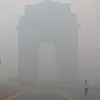This social enterprise is fighting air pollution with its affordable DIY purifiers
Developed by Thomas Talhelm for the China market in 2013, Smart Air purifiers were launched in India in 2015, and costs just Rs 3,500.
This year, Delhi’s air quality reached ‘severe’ levels with close to 500 AQI, and many people in the city were seen making a beeline to shops to get themselves air purifiers.
But Smart Air India, a social enterprise built around the ethos of frugal innovation, is disrupting the air purifier space in India with its do-it-yourself (DIY) kit. Priced at just Rs 3,500, it is almost half the price of most branded air purifiers available in the Indian market.
Developed by scholar Thomas Talhelm for the China market in 2013, the organisation has now grown leaps and bounds, and has expanded its reach to India, Mongolia, and the Philippines with shipments in Thailand, Pakistan, and Indonesia. It was launched in Delhi in 2015.

Thomas Talhelm
Today, Thomas is running Smart Air as a social enterprise with a mission to educate people about air pollution, the science behind purifiers, and affordable ways through which people can breathe fresh air.
“We think that if people saw the empirical data, most people wouldn't spend a fortune on air purifiers and masks,” says Thomas.
How it started?
In January 2013, Thomas, a PhD student, was doing his research in Beijing when the “airpocalypse” struck. Air pollution in China was so high that it was “beyond index” — higher than the air quality index ratings, and Thomas felt he had to do something about it.
When Thomas went to buy an air purifier, he was in for a shock — the most popular air purifying machine in Beijing cost over $1,000, and for a grad student like him, this was completely unaffordable.
Not ready to give up, Thomas dug deeper. He wondered what was inside these magic boxes that made them so expensive? He soon learned that the “active ingredient” in most air purifiers was a HEPA filter. He figured out the simple mechanism — a fan pushes air through the HEPA filter, and that was about it. “That’s all you need to filter dangerous particles from the air you breathe,” he adds.
Back then, he wondered why we can't just build purifiers on our own if they were so simple. He bought a HEPA filter and strapped it to a fan he had at home. And voila! An air purifier was ready for just about $30.

First prototype
But being a self-professed nerd, Thomas didn't stop there. He wanted the purifier he made to capture the tiny PM2.5 particles that can penetrate deep into our lungs. So, he spent nearly 10 times the original cost to buy a testing equipment — a laser particle counter.
Thomas then fashioned the DIY purifier in in his bedroom such that it tracked particulate levels across multiple tests. The data then became clear, which he published online along with instructions on how other people could make their own air purifiers. A few newspapers and magazines wrote about Thomas’ “discovery”, and the word spread in Beijing.
Soon, the Beijing Energy Network suggested he run a DIY workshop to show people how to build their own air purifiers; nearly 60 people showed up. Thomas also started getting email queries seeking his advice on the type of fan or HEPA filter that one can use for a DIY air filter. Seeing the growing demand, Thomas teamed up with friends Gus Tate and Anna Guo to launch Smart Air in 2013.
Smart Air in India
Soon after Thomas set up Smart Air in Beijing, he started receiving emails from India. With India's cities regularly topping the list of world’s most-polluted, people were worried about the rising air pollution levels, but without affordable purifier options.
“The emails said the DIY purifier really fit the jugaad spirit,” says Thomas. So, in 2015, he launched Smart Air in Delhi.

Dhariyash Rathod, India Head, Smart Air
Ever since it was launched in India, the company has been running air pollution workshops and providing open-source data and research on air pollution to help achieve its mission.
Dhariyash Rathod, India Head, Smart Air, says that in India, they run workshops for schools, embassies, businesses, and many others. “At our workshops, participants can take these two simple materials — a fan and a filter — and turn them into PM2.5-fighting machines in just a few minutes,” he says.
Dhariyash says the company is trying to dispel myths around air pollution in India, and teach people that clean air is simple and available to everyone.
“In these workshops, we explain how air purifiers work, how people can protect themselves from air pollution, and also show them how to make their own DIY air purifier. In India, we have organised several workshops in schools, universities, companies, and communities in both English and Hindi. We run all these air pollution workshops free of cost to help more people learn about air pollution,” he says.
Business of clean air
What sets Smart Air apart is that the company is a registered social enterprise whose mission is to cut the cost of clean air and clear out the marketing noise that inflates profit margins. The organisation is able to do this owing to its smart business model.
Smart Air cuts out the middleman, and ships most purifiers on its own. “We cut out the unnecessary gimmicks that bog down most purifiers like flashing lights, annoying apps, and ineffective ionisers,” says Dhariyash.
Because Smart Air is a social enterprise, profit is not its first motivation. “We intentionally make our prices as low as possible — with profit margins far lower than the norm in the industry. Then we take those profits and re-invest in open-source testing, workshops, and designing new machines,” he says, adding that 100 percent of the organisation's profit goes into creating clean air.
According to Dhariyash, their business model is based on a positive feedback loop. “The more purifiers we ship, the more revenue we have, and the more revenue we generate, the more we have to re-invest into providing people with clean air. That means every Smart Air purifier you buy helps even more people protect themselves from air pollution.”
Smart Air’s simplest purifier, 'DIY 1.1', costs Rs 3,500, and can be used in a normal-sized bedroom. Recently, it launched its new air purifier, called ‘The Sqair’, from ground-up, which Dhariyash claims is the world’s most cost-effective air purifier.
“The Sqair is the culmination of two years of design work and thousands of hours of testing. The Sqair is stronger and faster, yet quieter and is capable of cleaning larger bedrooms and living rooms,” he says. The company also ships pollution masks for kids and adults.
For larger spaces like offices and schools, it has Ladakh air purifiers. “Our in-house aeronautical engineer designed the Ladakhs to be virtually inaudible while putting out enough clean air to clean spaces of up to 1,400 sqft,” Dhariyash says, adding that the Ladakh puts out as much clean air as 1.9 IQ Air/s and costs a tiny fraction of the price.
Since its inception in India, Smart Air has shipped over 8,000 DIY air purifiers. “Currently, the Sqair is the most popular air purifier, which was funded successfully by our Kickstarter campaign. Our Ladakh air purifiers are providing clean air to offices at Zomato, Ford, BBC India, EPoD, and Auchan,” says Dhariyash.
Self-sustainable
Thomas says, “We have never accepted outside investment. Since day one, we have been self-sustaining. This gives us the freedom to make our decisions that are not based on what rich investors want, but on the best way to deliver clean air to people.” He adds that the company is open to external funding only from people who share their mission of delivering clean air to people in India.
Thomas is now an Associate Professor of Behavioural Science at the University of Chicago Booth School of Business. He continues to devote his free time to bring clean air to people around the world. Smart Air's operations are headed by various heads who are engaged with the company full time.
Future plans
India’s pollution levels remain critical, and the demand for air purifiers is expected to grow further in the coming years.
“Smart Air is still a small social enterprise. Our current market share in India is approximately 0.5 percent, which means there is still a huge opportunity not only to grow our share of the existing market but also to expand the market itself by leveraging our workshops to reach more middle and lower-income people,” says Dhariyash.
Smart Air wants to expand its operations to more areas where awareness on air pollution is limited by scaling workshop initiative by training air pollution educators and leaders in each of its target cities so that they can consistently provide workshops and interventions to their communities.

Smart Air India workshop at a school
“Our goal for the next two years is to expand our product line to include more pre-assembled products that will suit more people. We also aim to expand our presence in Tier-II and Tier-III cities in India. Finally, we want to outfit more offices, cafes, restaurants, and gyms with large-scale purification systems,” he says.
Commenting about Delhi’s alarming air pollution, Dhariyash says the winter air in Delhi is the worst because people are more likely to burn coal and garbage for warmth, and farmers in neighbouring states burn crop stubble. As a result, Delhi becomes a suffocating gas chamber.
“The problem of air pollution is very serious not just in Delhi but in other Indian cities as well where the air quality has been deteriorating and has already gone beyond safety levels due to rapid urbanisation. We all need to take a collective effort to overcome this problem. The government needs to take drastic measures and implement stringent enforcement to ensure we can breathe clean air,” he says.
(Edited by Megha Reddy and Evelyn Ratnakumar)







![[The Turning Point] What led these two brothers to launch children’s brand Rabitat](https://images.yourstory.com/cs/2/70651a302d6d11e9aa979329348d4c3e/SiddharthandSumit21-1615534122986.jpg?mode=crop&crop=faces&ar=1%3A1&format=auto&w=1920&q=75)

